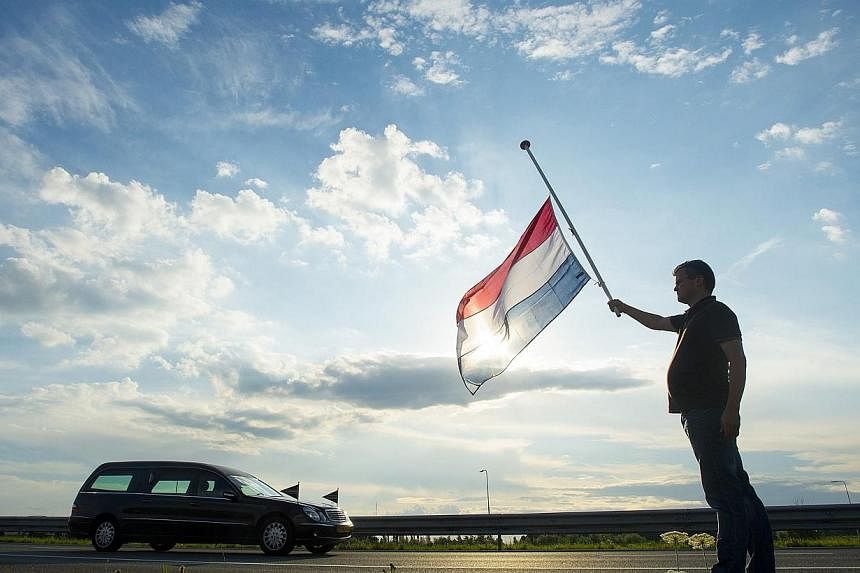ACULTURAL conundrum that I struggled to comprehend during my six years of living in Amsterdam concerned the Dutch attitude towards celebrities.
They are passionate about their own celebrities - far more than about Hollywood stars, which is fair enough - but in the midst of intensely gossiping about a home-grown film or sports personality, they will suddenly turn blase, as if the celebrity were a mere family member who had started to become uppity.
The explanation is in the size of the nation. When you've got a total population of 16 million crammed into a country smaller than most individual states in the United States, everyone is within a couple of degrees of separation from everyone else. Wesley Sneijder, Robin van Persie, and the other stars of its World Cup team are brought down to earth by the fact that, chances are, you know them, or your uncle does.
About two-thirds of the 298 people who died on Malaysia Airlines Flight MH17 were Dutch. I asked several Dutch friends how they were doing. As I more or less expected, every one of them knew at least one person who was on the plane. One friend, who lives in The Hague, said her daughter was friends with a girl whose entire family were on the flight: They were going on vacation to Borneo.
A few people want to lash out, saying the country should strike out against Russia. Someone posted the address of Vladimir Putin's daughter - who lives in the Netherlands - on the Facebook page of the Netherlands-Russia Centre. There were some vicious tweets.
But in the main, the reaction to the sudden loss of a cross section of Dutch society - the proportionate loss of life for a country the size of the US would be about 6,000 people - has been muted. The government declared a national day of mourning but events were already taking place everywhere, in a natural, non-official way.
The Dutch are strikingly different from Americans in their gut reactions to things. When hit with a national shock, Americans will almost instinctively reach for ideology or ideals. People saw the 9/11 terrorist attacks in the US as an assault on "freedom".
The Dutch have an innate distrust of ideology. You could relate that to World War II and their experience under Nazism but it goes back much further. It has something to do with being a small country surrounded by larger countries that have had long histories of asserting themselves.
It also stems from the fact that Dutch society grew not out of war against a human foe but out of the struggle against nature. Living in the lowlands on a vast river delta, the Dutch came together to battle water. Building dams, dykes and canals was more practical than ideological. For better or worse, the Dutch are more comfortable with meetings and remembrances than with calls to arms.
Geography has defined destiny throughout Dutch history. The little country has reached outward and prospered because of its ability to trade and engage with others. It also has proven to be a safe haven for refugees from less tolerant lands. Even before its 17th century golden age, Holland had become an intensely polyglot hub for goods and ideas, intricately connected with far-flung places.
MH17 reflects and updates that history. Of course, by definition, the plane was packed with travellers. But this tragedy gives an inadvertent indication of how racially mixed the country has become.
Among the Dutch passengers listed on the flight manifest were a Vietnamese family who lived in Delft, the city of Vermeer; a Chinese couple from Rotterdam; a Dutch-Israeli student; a Dutch-Malaysian family; a Dutch-American; people born in Curacao and South Africa; and others with German, Indonesian and British backgrounds.
We hear about the growing multi-ethnicity of the country mostly through the screeching of right-wing fanatic MP Geert Wilders,the leader of the Freedom Party, who riles up some elements of society by declaring that newcomers (read Muslims) are torpedoing Dutch traditions and turning the land of windmills into a giant mosque.
The international media is a sucker for Mr Wilders because he seems to give the lie to what the Dutch are most famous for (besides tulips and marijuana cafes): tolerance. The Dutch pioneered the concept in the 16th century, enshrining it in their de facto Constitution two centuries before "all men are created equal".
One truth revealed by this tragedy is that the country is quietly becoming a melting pot, a place intricately connected to other parts of the world. The Dutch people who died on MH17 mirror their own rapidly evolving society, and remind the rest of us that our futures don't lie in tribalism but in expanding our connections.
The writer is the author of Amsterdam: A History Of The World's Most Liberal City. He wrote this for Zocalo Public Square (www.zocalopublicsquare.org). Zocalo Public Square, a project of the Centre for Social Cohesion at Arizona State University, is a not-for-profit "ideas exchange" that blends live events and humanities journalism.

